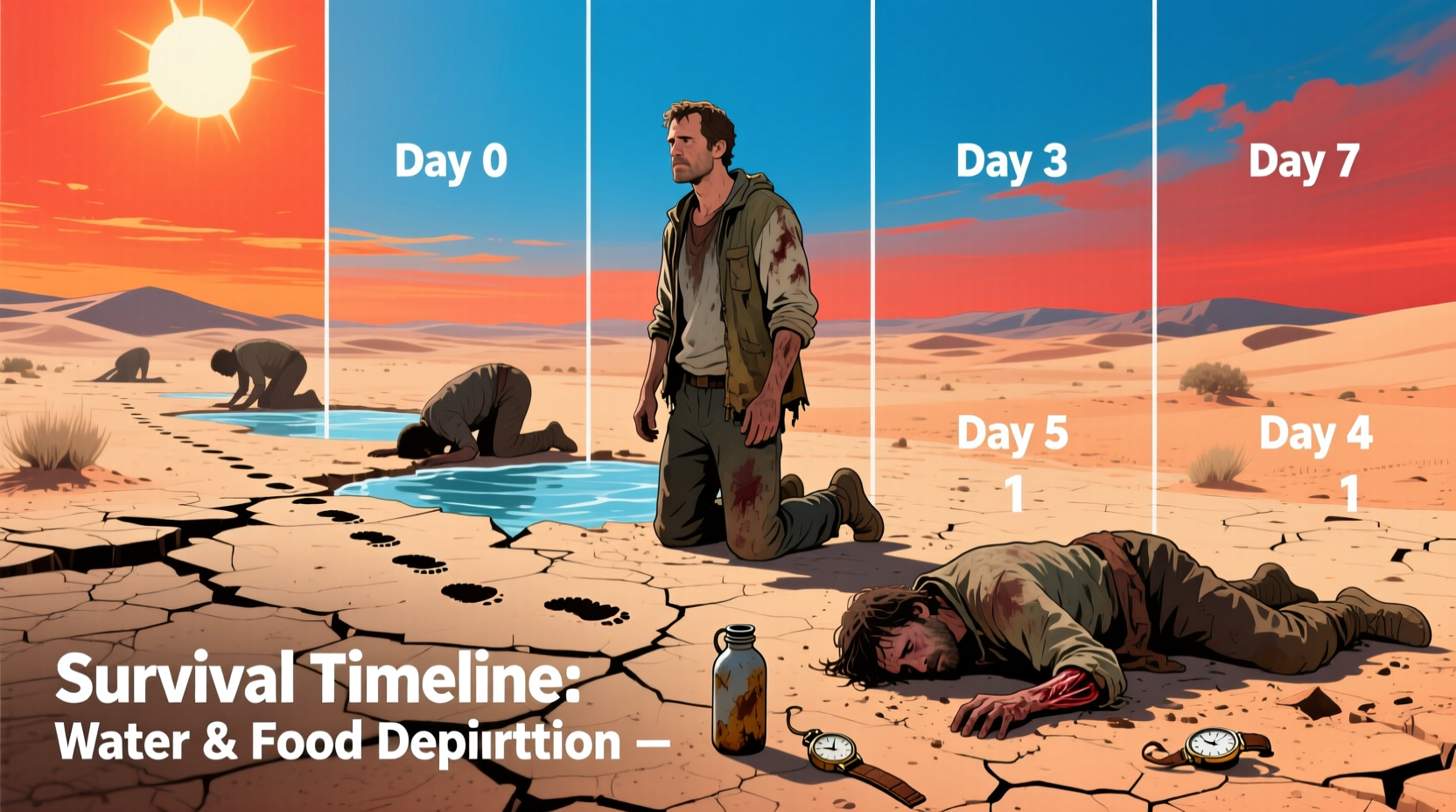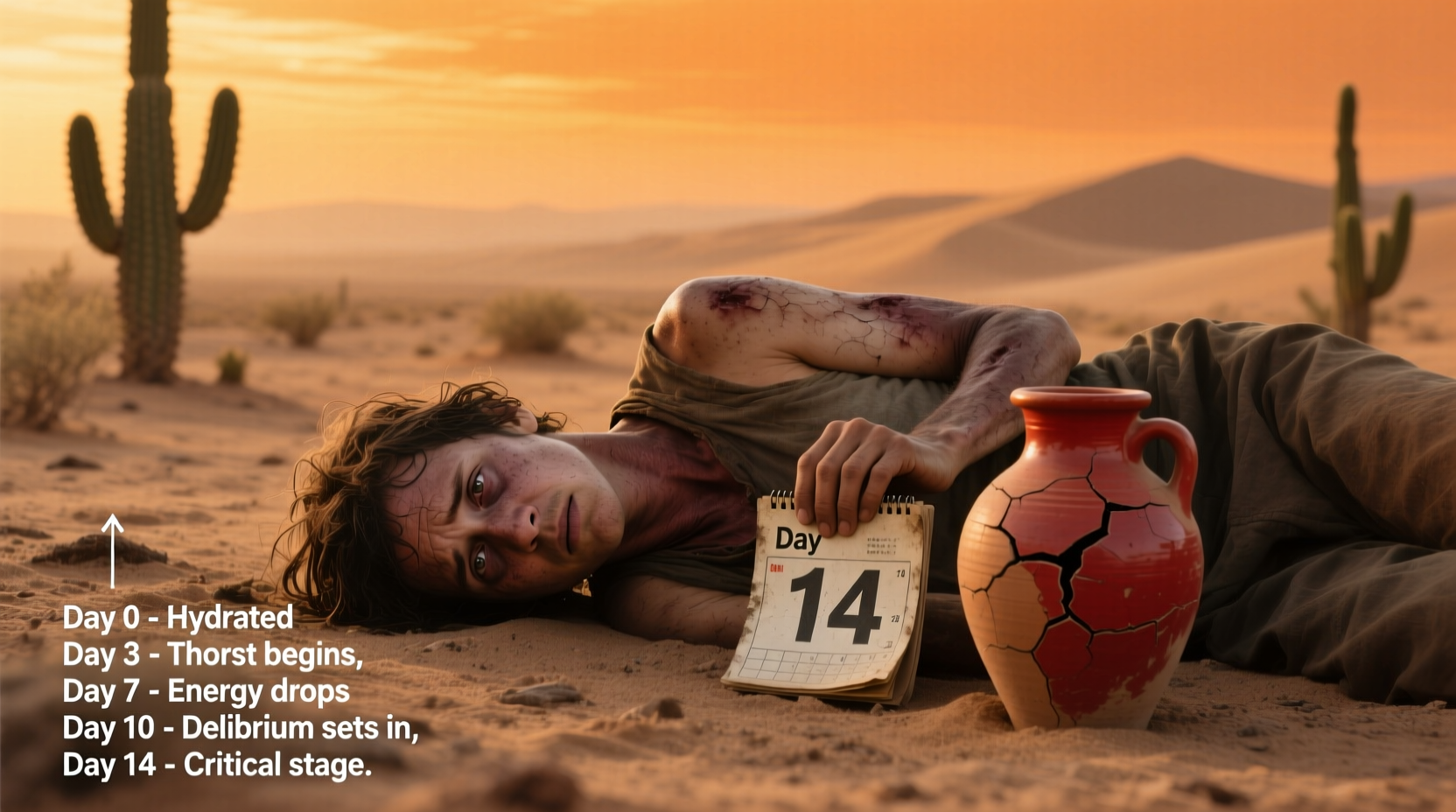Understanding Human Survival Limits: Water vs. Food
When considering survival without sustenance, it's critical to understand that water deprivation poses a far more immediate threat than food deprivation. Your body can function remarkably well without calories for weeks, but water is essential for basic physiological processes that maintain life.

Why Water Is More Critical Than Food
Water constitutes about 60% of your body weight and is involved in nearly every bodily function. Unlike food, which provides energy stores your body can tap into, water has no significant storage mechanism. When you stop drinking:
- Within hours: Dehydration begins affecting cognitive function and physical performance
- After 24 hours: Kidney function starts declining as the body conserves water
- By 72 hours: Organ failure becomes likely without intervention
Food deprivation follows a different timeline. Your body first uses glycogen stores (about 1-2 days), then moves to fat reserves (weeks), and finally muscle tissue. This process explains why survival without food significantly exceeds survival without water.
| Survival Factor | Without Water | Without Food |
|---|---|---|
| Average Survival Time | 3-5 days | 3-8 weeks |
| Primary Risk | Organ failure from dehydration | Electrolyte imbalance, organ damage |
| First Critical System | Kidneys | Metabolic processes |
| Documented Extreme Case | 18 days (Andreas Mihavecz) | 382 days (Angus Barbieri) |
Key Variables That Determine Survival Time
Your actual survival window depends on multiple factors that can dramatically shorten or extend these averages:
Environmental Conditions
Temperature and humidity significantly impact water loss. In hot, dry conditions (100°F/38°C), survival without water may be limited to just 2-3 days. Conversely, in cool, humid environments, survival time might extend to 7 days. The Centers for Disease Control and Prevention (CDC) notes that high temperatures increase water requirements by up to 50% during survival situations.
Individual Health Factors
Body composition plays a crucial role in food deprivation survival. Individuals with higher body fat percentages can survive longer without food as fat stores provide energy. According to research published in the Journal of the American Medical Association, body fat percentage directly correlates with extended survival time during starvation. Age, pre-existing medical conditions, and overall health status also significantly impact survival timelines.
Activity Level Considerations
Physical exertion dramatically increases water needs. The Wilderness Medical Society reports that strenuous activity in survival situations can reduce the water survival window by up to 60%. Remaining still and conserving energy is one of the most effective survival strategies when water is scarce.
Physiological Timeline of Deprivation
Understanding the body's progressive response to deprivation helps recognize critical warning signs:
Water Deprivation Timeline
- 0-12 hours: Mild thirst, reduced urine output, beginning of cognitive impairment
- 12-24 hours: Significant fatigue, dry mouth, headache, reduced kidney function
- 24-72 hours: Severe dehydration symptoms including dizziness, rapid heartbeat, confusion
- 72+ hours: Organ failure, unconsciousness, and ultimately death
Food Deprivation Timeline
- 24-48 hours: Depletion of glycogen stores, onset of ketosis
- 3-7 days: Increased energy from fat stores, potential for "starvation ketoacidosis"
- 1-3 weeks: Muscle wasting begins as protein stores are utilized
- 3+ weeks: Organ damage, compromised immune function, high mortality risk
Documented Survival Cases and Medical Evidence
Real-world cases provide valuable insights into human survival limits. The most extensively documented case of water deprivation survival is Andreas Mihavecz, an Austrian man who survived 18 days without water after being accidentally locked in a police holding cell in 1979. His survival was attributed to condensation from breath collecting on the walls, which he could lick for minimal hydration.
For food deprivation, the medically supervised case of Angus Barbieri, a Scottish man who fasted for 382 days under medical supervision in 1965-1966, represents the longest documented survival without food. Barbieri lost 276 pounds during this period but recovered fully with medical monitoring.
The Mayo Clinic emphasizes that these extreme cases represent exceptional circumstances with specific conditions that aren't replicable in most survival situations. Medical supervision was critical in the Barbieri case, highlighting why attempting extended fasting without professional guidance is extremely dangerous.
Recognizing Critical Warning Signs
Knowing when survival becomes critical can help determine when immediate action is needed:
- Severe dehydration indicators: No urine for 24+ hours, sunken eyes, rapid pulse, confusion
- Advanced starvation signs: Extreme weakness, edema (swelling), irregular heartbeat
- When to seek help: Any signs of confusion or loss of consciousness require immediate medical attention
The American Red Cross recommends that if you're in a survival situation with limited water, you should ration your intake rather than drink it all at once. Sipping small amounts regularly maintains hydration longer than consuming large quantities infrequently.
Emergency Preparedness Recommendations
Understanding survival limits informs better emergency planning:
- Maintain at least a 3-day water supply (1 gallon per person per day)
- Include electrolyte replacement options in emergency kits
- Learn to recognize early signs of dehydration before they become critical
- Store non-perishable food items that require no preparation
- Consider individual health factors when planning emergency supplies
Remember that rehydration after prolonged water deprivation requires medical supervision. The World Health Organization warns that drinking too much water too quickly after severe dehydration can cause dangerous electrolyte imbalances.











 浙公网安备
33010002000092号
浙公网安备
33010002000092号 浙B2-20120091-4
浙B2-20120091-4